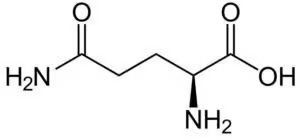Table of Contents
Key Takeaways
- L-glutamine is a conditionally essential amino acid, vital for brain function, as it serves as a precursor to neurotransmitters glutamate and GABA.
- Glutamine plays multiple essential roles in the body, including protein synthesis, muscle growth, immune system function, neurotransmitter synthesis, and glucose metabolism.
- L-glutamine supplementation can positively impact human growth hormone levels, muscle recovery, and intestinal permeability in inflammatory bowel disease.
- Maintaining a balance between glutamine and glutamate/GABA is crucial for optimal brain health, as disruptions can lead to various brain conditions and neurodegenerative diseases.
- L-glutamine supplementation can improve concentration, focus, memory, mood, and overall brain performance.
L-glutamine is a conditionally essential amino acid and main precursor for the production of the neurotransmitters glutamate and GABA (γ-aminobutyric acid) in your brain.
Glutamine is the most abundant amino acid in your body. And is involved in many of your bodily functions. Including much of the activity in your brain.[i] But L-glutamate is the most abundant amino acid in your brain. And the balance of these two is critical for optimal brain function.
The function of the glutamine/glutamate cycle is involved in protein synthesis, precursors for muscle growth, regulation of the acid-base balance in your kidneys, provides oxidative fuel for your intestine and immune system cells, provides nitrogen transport between organs, acts as precursors to neurotransmitter synthesis, nucleotide and nucleic acid synthesis for glutathione production, and glucose metabolism.[ii]
L-glutamine supplementation is mostly talked about in athletic and body building circles for its effect on human growth hormone and muscle recovery after a workout, or for its effects on inflammatory bowel disease (IBD) for its reduction in intestinal permeability. But L-glutamine is largely ignored by the nootropics community.
L-glutamine is so critically important to the optimized brain that by reading this post, you’ll understand why it may be an important addition to your nootropic stack.
L-glutamine helps:
- Neurotransmitters. L-glutamine is a precursor to the excitatory amino acid and neurotransmitter glutamate and aspartate. And the inhibitory amino acid and neurotransmitter GABA. Affecting alertness, concentration, focus, memory and mood.
- Brain Inflammation. L-glutamine helps boost your body’s immune response. Increasing antibodies to fight against viruses and bad bacteria. L-glutamine helps tame inflammatory cytokines. And L-glutamine detoxes the brain from excess ammonia and converts it into other amino acids, sugars and urea.
- Stress. L-glutamine supplies energy to immune and intestinal cells. Not enough glutamine and these cells become sluggish and can’t function properly. Supplementary L-glutamine is especially important during times of stress, tension and physical strain.
What is L-Glutamine?
L-glutamine is an essential amino acid and precursor for the production of glutamate. Glutamate is the most abundant neurotransmitter in your brain.

As an ‘excitatory’ neurotransmitter, glutamate is released from pre-synaptic cells and then binds to post-synaptic cells inducing activation. Too much glutamate and neurons become overactive causing a toxic environment that is harmful to neurons. And to cognition.
To keep this process in check, glutamate is also a precursor to the ‘inhibitory’ neurotransmitter GABA. GABA works by preventing neural signaling in over-excited neurons caused by glutamate that could result in anxiety and depression.[iii]
The balance of glutamine and glutamate has been identified in an array of brain conditions (i.e. mental illness, tumor, neurodegeneration) as well as in normal brain function.[iv]
The precursor relationship between glutamine and glutamate/GABA is often referred to in scientific and research circles as the Gln/Gly(GABA) cycle.[v] Glutamine is naturally synthesized from glutamate and ammonia in brain cells called astrocytes in a reaction catalyzed by glutamine synthetase (GS).
Newly synthesized glutamine is transferred to neurons and hydrolyzed by phosphate-activated glutaminase (PAG) to then produce glutamate. A portion of which may be decarboxylated to GABA or transaminated to Aspartate.
Glutamate, the excitatory neurotransmitter and GABA, the calming neurotransmitter rely on this cycle to maintain homeostasis within your brain. Glutamine also modulates the synthesis of Nitric Oxide by controlling the supply of its precursor arginine.
When this cycle gets out of whack, things start to break down. The results can be particularly nasty. And result in conditions like epilepsy, or hepatic encephalopathy which effects behavior, mood, speech, sleep and the way you move.
L-glutamine becomes a “conditionally” essential amino acid when your body can’t produce enough on its own. And you need to replenish L-glutamine levels either through supplementation or food.[vi]
L-glutamine can be found in foods such as beef, pork, fish, eggs, milk and dairy products, wheat, cabbage, beets, beans, spinach and parsley.
How does L-Glutamine work in the Brain?
L-glutamine helps brain health and function in several ways. But two in particular stand out.
- L-glutamine is critical for an optimized brain. L-glutamine is a precursor to the neurotransmitter glutamate in your brain. The balance of glutamine and glutamate is crucial to an optimized and healthy brain. The normal cycling of glutamine and glutamate takes a huge amount of energy in the brain. Research has estimated that the Gln/Gly (GABA) cycle accounts for more than 80% of cerebral glucose consumption.[vii] So when you’re using nootropics like Resveratrol or PQQ to boost mental energy, much of that energy is going towards maintaining this Gln/Gly (GABA) cycle.
A disruption of this cycle results in all kinds of problems including Reye’s Syndrome, epilepsy, bipolar disorder, schizophrenia, anxiety, depression, and alcohol addiction.[viii]One Korean study measured Glutamate and Glutamine concentrations in the prefrontal cortex of mice infused with an astrocyte toxin. And they used other inhibitors to disrupt the Glu/Gln cycle. Glutamate and glutamine levels decreased on the 5th day in the mice. The animals experienced immobility and a decreased preference for sucrose (sugar). A sure indication in mice of depression.Direct infusion of L-glutamine completely reversed all the impairments that were originally induced in the animals. And the researchers concluded that neuronal deficiency of L-glutamine causes depression.[ix]
- L-glutamine also helps prevent brain aging. Researchers have long been on the hunt to determine what causes the human brain to age. Recently, mitochondrial dysfunction has been implicated in the loss of brain function in neurodegenerative diseases and aging.[x] Leading to an abnormal increase in the excitatory neurotransmitter glutamate.
A study at the New York University School of Medicine used 28 patients with mild traumatic brain injury and 22 matched controls. Gray and white matter in their brains was measured using MRI’s. The study found that one year after traumatic brain injury there was significant global brain atrophy. Much larger than in the control subjects. The team noted the amount of brain damage from just one concussion. And that this type of injury was not exclusive to a severe blow to the head. Even mild injury could cause brain damage.[xi] Most of the damage was associated with a disrupted Glu/Gln cycle and an abnormal increase in glutamate levels.[xii]
How things go bad
Low levels of L-glutamine are associated with a variety of health problems.
↓ Cellular energy drops and immune system weakens
↓ Short- and long-term memory declines
↓ Mood and anxiety disorders, insomnia, and lack of concentration
↑ Muscle spasms, hypertension, convulsion, Tourette’s Syndrome and epilepsy
↑ Ammonia levels rise in brain cells[xiii]
↓ Poor digestion, bloating, flatulence, and constipation
When your neurotransmitters, including L-glutamine and glutamate are in balance, you feel motivated, productive and energetic. And you feel calm and relaxed during downtime.
When L-glutamine levels are low you feel filled with dread, you’re constantly worried, you have racing thoughts, and you’re frequently late and disorganized.
Many people in this L-glutamine -slump resort to high carbohydrate foods, and drugs or alcohol to relax.
L-Glutamine benefits
The amino acid L-glutamine is the precursor to L-glutamate production in your body. L-glutamate gets converted to GABA.
 Glutamate is your body’s most abundant excitatory neurotransmitter. Which is responsible for attention span, brain energy, learning ability, memory, and staying awake.
Glutamate is your body’s most abundant excitatory neurotransmitter. Which is responsible for attention span, brain energy, learning ability, memory, and staying awake.
An enzyme called glutamate decarboxylase converts glutamate to GABA. It does it with the help of the active form of Vitamin B6 (Pyridoxal-5-Phosphate (P5P)).
The amino acid taurine helps increase the communication and productivity of this enzyme. And zinc helps the release of GABA from its receptors.
When this Gln/Gly (GABA) cycle works efficiently, you feel relaxed with no stress or feelings of anxiety. Detoxification of your liver results in a more restful night’s sleep. Focus, concentration, memory and mood all improve.
How does L-Glutamine feel?
During times of chronic, long-term stress caused by physical exertion or illness, glutamine levels in your body can drop by 50% or more.[xiv]
Supplementing with L-glutamine can improve your quality of life, increase energy levels, reduce muscle aches, improve digestion and gut health, improve quality of sleep, and reduce pain and fatigue.
When you balance L-glutamine levels in your brain, you feel relaxed and calm. Cravings for sugar and alcohol will decline.
L-glutamine will help in recovery from workouts and improve performance. You may find it easier to lose weight.
Many neurohackers use L-glutamine to help heal Leaky Gut Syndrome and reduce the symptoms of Crohn’s and Celiac Disease.
As a nootropic, L-glutamine can help improve alertness, concentration, focus, memory and mood.
L-Glutamine Clinical Research
L-glutamine was identified as a neurotransmitter several decades ago. And there has been a lot of research on L-glutamine published since. But most of it is focused on strength training and maintaining muscle mass in athletes. And for people healing from surgery or recovering from illness.
But L-glutamine can be a powerful nootropic as well. Here are a couple of studies looking at L-glutamine for brain health.
L-glutamine Increases Human Growth Hormone
Bodybuilders and athletes use supplementary L-glutamine to help repair and build muscle. And there are several studies supporting the notion that L-glutamine increases Human Growth Hormone.
In one study, researchers worked with 9 healthy subjects and gave them 2 grams of L-glutamine in a cola drink. Blood samples were taken before drinking the cola-spiked drink, then again at 30 mins., 60 and 90 mins.
The researchers found that both blood L-glutamine and human growth hormone levels were significantly higher than before taking L-glutamine. The team concluded that “a surprisingly small oral L-glutamine load was capable of elevating growth hormone”.[xv]
Human growth hormone and Brain-Derived Neurotrophic Factor (BDNF) are intricately linked. BDNF is involved in Long-Term Potentiation and the encoding of long-term memories.
L-glutamine Improves Cerebral Performance
Lack of concentration and poor memory can be improved by supplementing with L-glutamine with Vitamin B3 (niacin). Some of the glutamine in your blood is transformed into glutamic acid in your brain.
Glutamic acid functions first as fuel, but it also gets rid of excess ammonia by binding to this cellular toxin and converting it into glutamine.
A study in the Netherlands conducted a randomized, double-blind, placebo controlled trial with 42 healthy men and woman aged 40 – 76 years. Subjects received a 5-gram stack containing glycine, L-glutamine and niacin twice daily for 3 weeks.
The L-glutamine stack increased Human Growth Hormone a whopping 70% compared to placebo. But surprisingly it wasn’t the growth hormone that improved memory and vigor. It was insulin-like growth factor-I that improved memory and vigor. Attributed to the L-Glutamine stack the subjects took for 3 weeks.[xvi]
L-Glutamine Nootropic Recommended Dosage 
Most people don’t get enough L-glutamine from food alone. And why adding L-glutamine to your nootropic stack can boost your immune system, improve your ability to fight infection and diseases, and boost cognition.
The recommended daily dosage of L-glutamine is 2 to 5 grams per day.
Serious power athletes often dose up to 10 grams of L-glutamine per day.
L-Glutamine Side Effects
L-glutamine is considered very safe when taken in normal recommended doses.
Rarely do people report side effects like nausea, vomiting, flatulence, abdominal pain, constipation, dry mouth, hemorrhoids, dizziness, depression, skin rashes, insomnia and increased sweating. Remember, the balance between L-glutamine and glutamate (Gln/Gly (GABA) cycle) is critical for optimal health.
If you are dealing with any form of cancer and are either being treated for it or are in remission, you should consult with your doctor before you start supplementing with L-glutamine.
If you are dealing with cirrhosis of the liver, you should avoid L-glutamine. If you have severe liver disease that includes difficulty thinking or confusion (hepatic encephalopathy), don’t use L-glutamine.
If you are allergic or sensitive to Monosodium Glutamate (MSG), you may be sensitive to L-glutamine because your body converts it to glutamate.
And if you have a severe mental disorder including mania or frequently have seizures you may want to avoid L-glutamine.
Types of L-Glutamine to Buy
L-glutamine as a supplement is available in tablet, capsule and powder.
The most commonly available form of L-glutamine as a nootropic supplement is called “free form” glutamine.
Trans-Alanyl or Alanyl-L-glutamine is an amino acid attached to another amino acid which aids in digestion of this supplement.
If you are using it to boost athletic performance and speed recovery, both forms of L-glutamine are best taken right before or after a workout. Using it with small meals before or after your workout session can help support your metabolism and weight loss goals. And will assist in muscle building, recovery and maintenance.
Nootropics Expert Recommendation
L-Glutamine 2 – 5 grams per day.
 I recommend using L-glutamine as a nootropic supplement if you’re dealing with anxiety or stress. And to calm or keep in check some of the stimulatory effects of some nootropics.
I recommend using L-glutamine as a nootropic supplement if you’re dealing with anxiety or stress. And to calm or keep in check some of the stimulatory effects of some nootropics.
Your body does make L-glutamine on its own from glutamate in your brain. But most people do not maintain an adequate supply of L-glutamine in their system.
And if you’re dealing with illness, recovery from surgery, strenuous physical activity like working out, Leaky Gut Syndrome, Crohn’s or Celiac Disease, and need some help in recovery, L-glutamine can help.
L-glutamine also helps to curb the desire for sugar, carbs and alcohol.
We suggest trying a L-glutamine supplement first at a dose of 500 mg. And see how you react. You can safely dose up to 20 grams of L-glutamine per day. But most neurohackers find much lower doses effective for boosting cognition, mood and memory.








Join The Discussion - 148 comments
Rex Featherstone
April 13, 2024
David, would you say that L-Glutamine is the best nootropic for increase glutamate levels. What are some others you would recommend?
David Tomen
April 17, 2024
Rex, L-Glutamine is by far the best because it goes on to make glutamate within 20 minutes of taking the supplement.
Lianne
November 21, 2023
Hi David, once again thank you for your brilliant work.
I take L-Theanine 200mg x2/3 a day for anxiety likely associated to adult ADHD and it’s had an amazing impact. I have also suffered with IBS and varying gluten and lactose intolerances for 17 years and read glutamine could help with some of this. As an aside, from lots of reading I am concluding that there seem to be strong links between poor intestinal functionality and brain conditions such as ADHD and autism.
Firstly, if I take glutamine as it will become glutamate then GABA, will having it with L-Theanine be doubling up on glutamate and GABA – in a good or a bad way? Or May I find that my anxiety and IBS and aspects of ADHD (recently read a paper on Glutamate receptors involvement in ADHD https://www.nature.com/articles/s41598-023-47117-5#Sec16) might be helped by glutamine alone? You have mentioned that L-Theanine reduces the excitatory /stress aspects of too much glutamate. I love the impact that L-Theanine has been having, also for it’s boosting of alpha brain waves & dopamine and serotonin so would like to keep taking it.
Also you mentioned that the Gln/Gly (GABA) cycle uses 80% of brains glucose consumption. I notice in my 11-year-old son who also has ADHD, when his glucose levels drop after intense exercise his mood changes very dramatically to irrational anger, self-loathing, tears. It’s as if his body’s exertion has used up vital glucose and there’s non left for his brain to function correctly. We have to ensure he has a good supply of glucose before and during exercise to prevent this crash.
I know there are strong links between glucose and dopamine – do you think there could additionally be a link between glucose, ADHD and potentially this cycle if it’s using so much glucose, and do you think L-glutamine supplementation could help with this?
Thank you
David Tomen
November 22, 2023
Lianne, L-Glutamine goes on to produce glutamate and then GABA. And finally Human Growth Hormone. You can read all the benefits from supplementing with L-Glutamine from my review above. I to find when my sugar drops everything goes south and the easiest solution is eating a chocolate bar or anything that will restore glucose in my system. It works within 5 minutes.
SHARON
October 11, 2023
been having alot of anxiety , as i have gut issues, ibs , colites , my gut causes me to feel this anxiety and depression. will glutamine help. i use to take glutamine , not sure if its good for brain health, it did help a little thx Sharon
David Tomen
October 12, 2023
Sharon, L-Glutamine is well known for helping with gut issues. And it is a precursor to the production of GABA which should help with anxiety and sleep. And you can use it during the day and it will not make you sleepy.
SHARON
September 27, 2023
hi , is it good to take a break when taking it for inflamation colites. like 7 days off.
David Tomen
October 1, 2023
Sharon, there is no need to cycle L-Glutamine because it is completely gone from your system within 2 – 4 hours after you take it as a supplement.
Amanda
August 9, 2023
I started l-glutamine a week ago and the first few days were great in-regards to no bloating, regular digestion, no cravings, energy, and no anxiety! However, I’ve noticed a lot of heart palpitations an hour after I take it, tremors/tingles, and insomnia. I do have a sensitivity to msg and had a urine neurotransmitter test done before that showed high glutamate levels. Whether or not that’s accurate, I can attest that I am not well when msg is consumed. It will spark a histamine reaction and I have to take Allegra. I did take some Allegra last night and those symptoms subsided. Wondering if the l-glutamine is activating the histamine by raising already high levels of glutamate. What other supplement could replace l-glutamine to help with leaky gut? Also, would the absence of anxiety be from the increased GABA levels? I know I’ve done well with progesterone before with its GABA enhancing benefits. Wondering if supplementing with a GABA supplement would be beneficial alone?
David Tomen
August 10, 2023
Amanda, did you read my review above including “L-Glutamine Side Effects“? If you are allergic or sensitive to Monosodium Glutamate (MSG), you may be sensitive to L-glutamine because your body converts it to glutamate.
That is not the case when using a GABA supplement. And the most effective one I’ve found is PharmaGABA. But there is no way to know if GABA supplements may reduce your anxiety unless you know for sure that your anxiety is caused by a deficiency in GABA.
See my article on how to heal a leaky gut/blood-brain barrier: https://nootropicsexpert.com/how-to-heal-a-leaky-blood-brain-barrier/
Deema
July 12, 2023
Hello David
I have depression.l tried taking 500 glutamine once.
I didn’t feel any improvement Actually l felt worse later that day l don’t know if the glutamine brings the affect at the same day or its just my mood swings?
David Tomen
July 14, 2023
Deema, L-Glutamine goes on the make glutamate which goes on to make GABA. And that cycle is critically important. If there is a problem somewhere in the conversion between steps in the cycle it could cause problems. Scroll back up and read the section called “Side Effects”. You could also try PharmaGABA instead to increase GABA levels. IF that doesn’t work then it’s likely not GABA that is your problem.
Deema
July 16, 2023
Thanks alot
Paulinesb
February 17, 2023
I have short term memory. Ive always had this. Since taking other amino acids it has helped me, a year in May. . But really want to see if L glutamine will help me even more. I may end up with all three Glutamine, glycine and niacin b3.
I recieved a L glutamine order today. I already take glycine. I’m trying to learn how to stack.
I take other amino acids for energy. I play pickleball 15 to 20 hours a week. Its helped a lot for energy and recovery. I’m age 68, 69 in May.
If you have suggestions I’d appreciate any.
Thanks David
David Tomen
February 19, 2023
Pauline, The recommended daily dosage of L-glutamine is 2 to 5 grams per day. Serious power athletes often dose up to 10 grams of L-glutamine per day. So, unless you think of yourself as a “Power Athlete” I suggest starting with a lower dose. Try 1 – 2 grams to start with.
Rebecca Vowler
December 30, 2022
Glutamine has a bad effect on me but I need it to fix my gene defect skeletal dysplasia. However it turns into glutamate. Maybe a b6 deficiency was stopping it from converting into GABA?
David Tomen
January 13, 2023
Rebecca, could be so try using high quality BioActive B-Complex which includes P-5-P like this one: https://nootropicsexpert.com/go/life-extension-bioactive-b-complex/ along with Taurine (https://nootropicsexpert.com/taurine/).
Paulinesb
February 20, 2023
David, I am not a power athlete. I just play a lot where as felt I may need both benefits glutamine can give me.
Thank you
Pauline
March 14, 2023
David, I starter taking L Glutamine after workout. It helped with recovery and kept me energized. At first when I started taking it in very small dose, I thought it was just me feeling good. Then by the 4th day I determined it was indeed the L Glutamine effect. Then I thought to try it in the morning. So I took it early about 2 hours before I take my Essential Amino Acids. My EAA helps with energy for my Pickleball games.
Amazingly this was my third day of taking it like this. My focus was excellent and concentration helped me to remember the score so much better and the noise on our busy pickleball gym was not distracting. All I can say is WOW. I am amazed at how its working and aiding in my short attention span and memory. I’m calm and have not gotten excited or lost my composure. In pickleball it can get a bit heated. So these last three days with the way I have been taking it have been fantastic. It doesnt seem there is any interference from taking L Glutamine then taking my EAA 2 hours later. It seems to be working very well with me.
I must have been deficient in L Glutamine because i can tell the difference clearly.
Thank you
David Tomen
March 20, 2023
Thanks for the report Pauline.